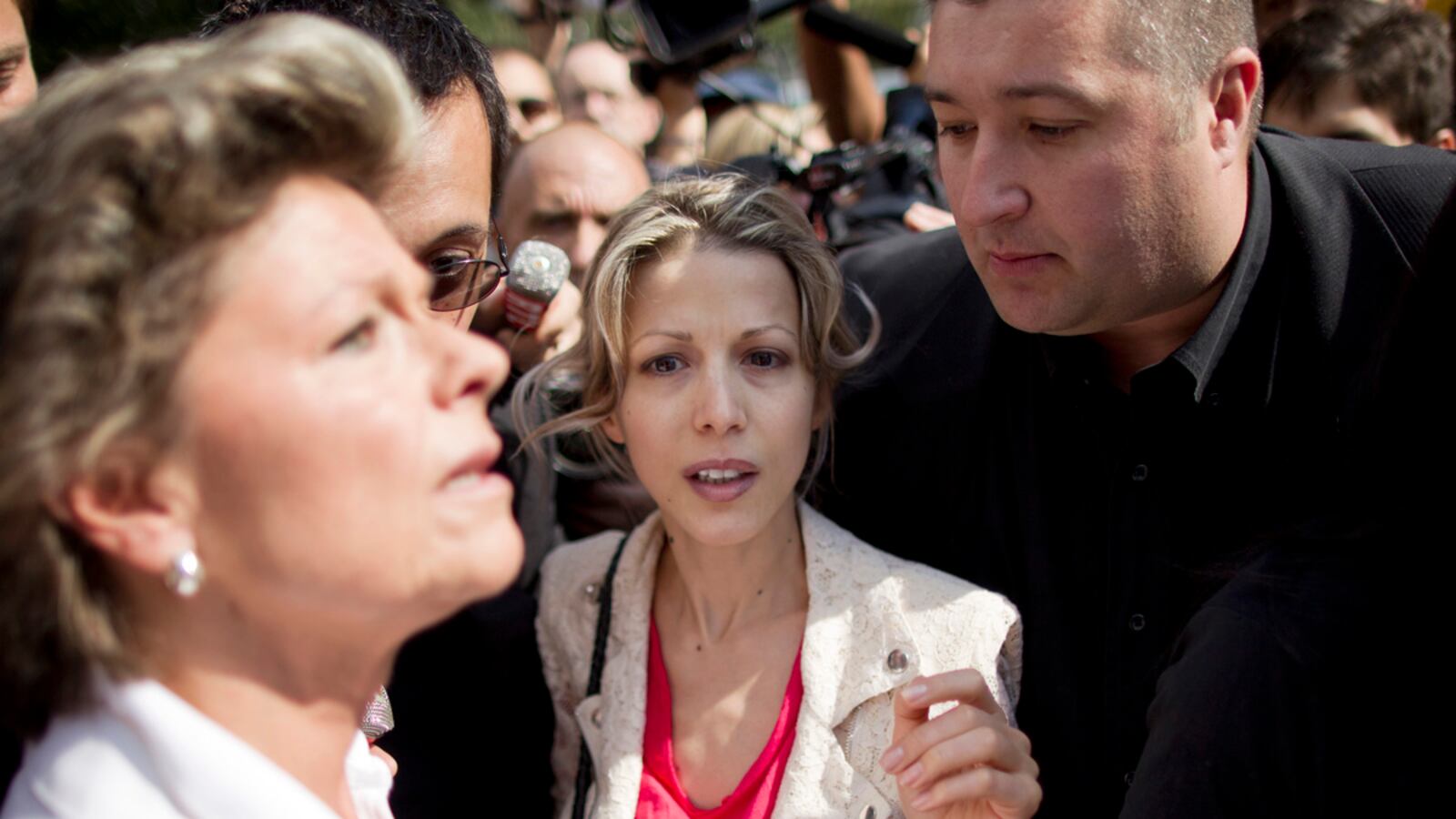French police continue their inquiry into a young writer’s accusation of attempted rape against former International Monetary Fund chief Dominique Strauss-Kahn. On Thursday, Tristane Banon, 32, and Strauss-Kahn, 62, met at a Paris police station, their first encounter since 2003, when Banon says Strauss-Kahn tried to rape her during an interview. The meeting is presumed to be the investigators’ last move before authorities decide how to proceed: either they’ll bring charges against Strauss-Kahn, decline the case on the grounds of a statute of limitations—if they find the accusation falls under the category of sexual assault rather than attempted rape—or drop the proceedings altogether. By all accounts, no matter what happened in the sparsely furnished Left Bank apartment where the writer and politician met alone, making a legal case eight years later is going to be difficult. But right now, the public-relations battle increasingly appears to be Banon’s to lose.
The meeting of accuser and accused, a so-called confrontation, is standard practice in France. It allows investigators to parse contradictory stories in real time, and rehash the course of events with both parties present. Banon and Strauss-Kahn appeared without their lawyers, and reportedly did not address one another directly while they were interviewed by police. Banon has claimed that she fought off Strauss-Kahn when he behaved “like a rutting chimpanzee,” trying to pull off her jeans and unclasp her bra. Strauss-Kahn has called Banon’s version “imaginary.” According to leaks from his solo interview by police earlier this month, DSK admitted that he tried to kiss Banon, but said he was rebuffed and dropped his advances. On Thursday, both parties reportedly stuck to their stories throughout the session, which lasted more than two hours.
Banon brought her allegations against the one-time Socialist Party presidential frontrunner to the police in early July, just after Manhattan prosecutors began to question Sofitel chambermaid Nafissatou Diallo’s credibility, and the viability of her attempted-rape case against Strauss-Kahn. However, throughout the summer, Banon remained noticeably silent on the matter, mostly letting others speak for her—notably her mother, Anne Mansouret, an elected Socialist who told police in July that she had engaged in “brutal” if consensual sex with Strauss-Kahn herself years before her daughter’s alleged run-in.

In recent weeks, as Strauss-Kahn returned to Paris after criminal charges were dropped in Manhattan, and as rumors swirled that Banon’s own case was doomed, the writer has stepped up to speak for herself. Last week, appearing on the popular talk show Le Grand Journal just 24 hours after Strauss-Kahn’s first interview since his arrest, Banon announced that if French authorities dropped her case, she would bring a civil suit against Strauss-Kahn. Last weekend, Banon joined feminist groups protesting violence against women outside Paris’s main courthouse, a demonstration that was sparsely attended but heavily covered by local media due to her presence. And Thursday evening, hours after the police confrontation, Banon appeared on the TF1 nightly news, on the same set where Strauss-Kahn gave his first interview on Sept. 18, to call DSK a liar.
Until this month, the usual stock footage of Banon was from years ago, when she appeared on an unusual talk show where guests sit around a candle-lit dinner table. As she told her story through nervous laughter, with Strauss-Kahn’s name censored, it made the tale seem like offhand dinner gossip. Later, she was often pictured being hurried to a car by her lawyer, with her Weimaraner dog romping behind them. As the accuser in the wings, Banon seemed every bit the eccentric writer. But she may well benefit—and Strauss-Kahn’s image may suffer further—from her decision to speak for herself. Wispy, pale, with a down-to-earth speaking manner, her hair tousled, wearing jeans and a T-shirt and a leather jacket for an important interview, she is strangely ageless. She is 32, but could easily pass for 16—and her every-daughter appearance could well affect women watching at home who have yet to buy into Strauss-Kahn’s attempted image remake.
On TF1 on Thursday night, Banon recounted the day’s confrontation with Strauss-Kahn, saying she maintained her accusations in the face of the accused. “I know, I am certain, that he would have raped me… if I hadn’t been able to escape,” she told TF1’s popular anchor Laurence Ferrari. “I had in front of me exactly the same Dominique Strauss-Kahn that I saw Sunday night on your set, with the same arrogance, the same coldness,” said Banon. “Sincerely, I thought he would apologize, not that he would admit to the crimes, but that he would apologize at least for what he has conceded. He didn’t even do that. He didn’t even dare to look at me.”
Strauss-Kahn has filed a libel suit against Banon for her attempted rape allegations. But Banon did not shy from commenting on his other troubles. Asked on TF1 if she was surprised to hear that Strauss-Kahn’s American lawyers were pleading for his diplomatic immunity ahead of the civil suit by Nafissatou Diallo, Banon answered, “No, it seems just like him. But I wonder about the necessity for diplomatic immunity for an innocent person. Me, as far as I’m concerned, if I were wrongly accused of something, I don’t need diplomatic immunity. The truth is enough.”
After the interview, Strauss-Kahn’s lawyers responded with a communiqué maintaining that, “Dominique Strauss-Kahn formally contests having assaulted Madame Tristane Banon and notes that she is also lying about how the confrontation this morning unfolded.”
Strauss-Kahn, who—between his Sept. 18 interview on TF1 and Thursday’s police confrontation—spent time at his villa in Marrakesh, has failed to resuscitate his image since returning to Paris on Sept. 4. In a French poll following his long-awaited first TV appearance, only 4 percent of those surveyed felt his image had improved with the interview, compared to 56 percent who thought it had not changed and 31 percent who thought it had deteriorated. A new poll out Friday in Elle magazine in France shows that 54 percent of French women surveyed approve of the supportive attitude of Strauss-Kahn’s wife, Anne Sinclair, throughout the Sofitel affair, even though only 17 percent think Sinclair believes her husband is innocent. But more pointedly 74 percent of the women surveyed say that personally, they would have left him.
Strauss-Kahn’s Socialist Party, meanwhile, has taken its distance, with interim party leader Harlem Désir declaring that DSK is “no longer an actor” in French political life. The party, after months of shock and soul-searching, finally appears to have moved on, as primary ballots loom in October. The Socialist frontrunner for the nomination, François Hollande, is polling very well, while President Nicolas Sarkozy is hamstrung by a series of scandals involving his associates. The 2012 presidential election today doesn’t seem quite so unwinnable for the Socialists as it did on May 15 as France woke up to the staggering news of Strauss-Kahn’s arrest just days before he was expected to declare his candidacy.
For Dominique Strauss-Kahn, there remains a possibility that neither of his accusers, Diallo in the Bronx or Banon in Paris, will see their cases go to any sort of trial. But in the eyes of his home country, where he enjoyed sky-high popularity only months ago, DSK’s triumphant return has been anything but.






